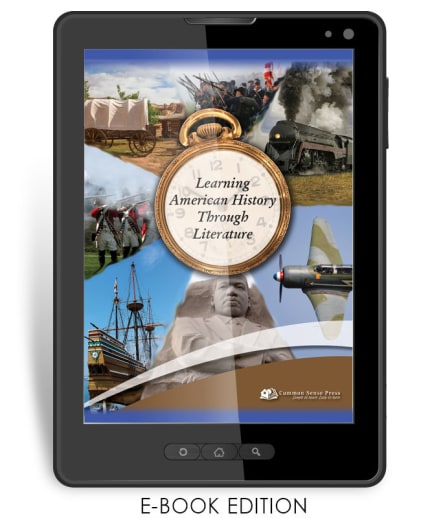If you are looking for an American history program that is literature based and easy to use with multiple grades working together, this one's for you! In Learning American History Through Literature, American history is divided and covered in seven units. It can be used through one or two school years, depending on the ages of your students and how in-depth you choose to go. The seven units are Colonial, Revolutionary War Period, Westward Expansion, Civil War Period, Industrial Age, World War Years, and Postwar Years, cumulatively covering the years 1607-1968. In each unit, there are several book lists of read aloud titles and student reading. There are also vocabulary word lists, and activities to make and do. These include projects such as dipping candles, sewing a simple quilt or cooking. The activities are intended to help uncover hidden parts of the story and help students get a feel of what it was like living during that era.
Inside each unit, materials are organized by using and briefly defining the literary terms repeatedly. The main terms are prologue, setting, plot, dialogue, and epilogue. They introduce the unit, give the book lists for read aloud to learn the setting, talk about teaching plot, and dialogue about the era. Also listed here are numerous short book and chapter book choices for the student to read for content. The epilogue section of the units includes a list of people pertinent to the era and suggests choosing one, read their biography, and for the older student to research and conclude the unit with a presentation. Presentation instruction and timeline suggestions are in the appendix. Each unit also contains discussion questions for dialogue and review. This curriculum is written in a relaxed Charlotte Mason style and there are no quizzes or tests. The appendix contains vocabulary practice activities, reproducibles like puzzles, activity patterns, recipes and much more. Optional project instructions are also found in the appendix. The material is offered in print form or eBook. -Judy

